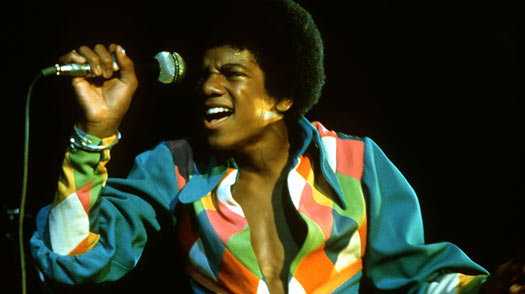
Michael Jackson performs in 1980.
The story starts with talent. Not the sort of talent that wins the lead in the school musical, or even the sort that wins American Idol. This is vanishing-point talent, so far to the right of the bell curve that it needs its own sheet of graph paper. It's lonely way out there — but that part of the story comes later.
So here's Don Cornelius, creator of Soul Train, taking us back to the beginning. It's the mid-1960s. Cornelius is a Chicago disc jockey and announcer at WVON, a powerhouse of the black-music scene. And he finds himself at a show where five brothers from a Gary, Ind., family are coming onstage to perform some predictable covers of songs from established groups like the Temptations. Family acts have a checkered history, talentwise, so Cornelius is ready to be underwhelmed.
And then this kid, maybe a second-grader, spins his way out of the pack of older boys and opens his mouth to sing. And the sheer weight of Michael Jackson's talent lands as unexpectedly as a cartoon safe dropping from a desert sky. "He's only 4 ft. tall," Cornelius recalls, "and you're looking at a small person who can do anything he wanted to do onstage — with his feet or his voice. To get to the level of people who can do that, you're talking about James Brown as a performer. You're talking about Aretha Franklin as a singer. Michael was like that as a kid. He did it all, within the framework of one package. Nobody else did that."
Michael Jackson wasn't one of those child stars who was driven to success by an overbearing parent, though his father Joseph Jackson was indeed overbearing to the point of violence. He wasn't a child star who briefly captured the passing fancy of Tiger Beat with a mixture of tenor and bangs. Even his fluffiest boyhood smash, "ABC," was far more sophisticated than the abundant bubblegum sugaring the Top 40 airwaves circa 1970. He wasn't boosted to stardom by the Jackson 5; the group just tried to hang on to his rocket. Jackson was a force of nature, an inevitability. All the rest is biography, what-ifs and consequences.
He was born on Aug. 29, 1958. His mother Katherine was a dedicated Jehovah's Witness with a sweet singing voice who endeavored to protect her large family from the widespread sin of the surrounding city. His father was a crane operator and decent guitar player. Together the parents fixed on the idea of a family singing group, which might keep the boys off the streets and — just maybe — give the family a ticket out of their dead end. As first conceived, the group didn't even include Michael. He was too young. But when he was about 3 years old, he started singing the stuff he heard his brothers rehearsing. Talent announced itself. From then on, he was the acknowledged star.
Joe Jackson drove his sons relentlessly. He ridiculed their shortcomings and punished them for their mistakes. He supervised daily practice sessions with a whip in his hand; he beat the kids with fists, hangers, a razor strop. None of it was necessary to motivate Michael, for the boy was a sponge when it came to developing his craft. He studied the singing of Jackie Wilson, Diana Ross, Sam Cooke, Stevie Wonder. At an age when most kids are learning the basics of do-re-mi, he was self-administering an advance course in the Godfather of Soul. "I think James Brown is a genius, you know. When he was with the Famous Flames — unbelievable," Jackson once told Oprah Winfrey. "I used to watch him on the television, and I used to get angry at the cameraman because whenever he would really start to dance, they would be on a closeup, so I couldn't see his feet. I'd shout, 'Show him! Show him!' so I could watch and learn."
Joe booked his boys into Gary's dives and strip joints, where they earned token fees plus whatever the audience tossed onto the stage. Six-year-old Michael crawled along the floor scooping coins into his pockets until his pants sagged. The next step was the so-called chitlin' circuit of black nightclubs, and from there, the Jackson brothers made it to Harlem's Apollo Theater, where the group won an amateur-night competition in 1967. That same year, the Jacksons opened for Gladys Knight and the Pips, who were part of Berry Gordy's astonishing catalog of artists at Motown Records. Knight was so struck by the adorable prodigy that she urged the Motown boss to take a look.